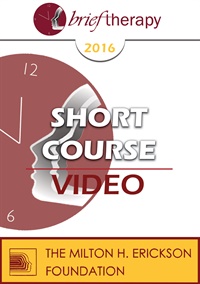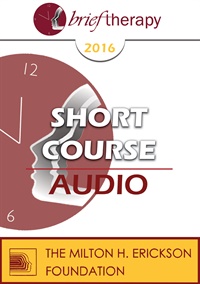
- Average Rating:
- Not yet rated
- Topic Areas:
- Psychology | Short Courses | Energy Psychology | Brief Therapy | Neurobiology | Single-Session
- Categories:
- Brief Therapy Conference | Brief Therapy Conference 2016
- Faculty:
- Cheryl Bell-Gadsby, M.A., R.C.C. | Kathleen Donaghy
- Duration:
- 1:32:46
- Format:
- Audio Only
- Original Program Date:
- Dec 08, 2016
- Short Description:
- Drawing from and integrating the latest neurobiology and energy psychology research findings and case studies, we present an array of brief tools and skill sets to guide therapists in the incorporation of energy psychology techniques into their existing practice and therapist toolboxes. This workshop will include demonstration and skill practice.
- Price:
- $15.00 - Base Price
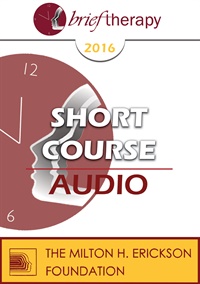
- Average Rating:
- Not yet rated
- Topic Areas:
- Short Courses | Bipolar | Utilization | Art and Creativity | Brief Therapy | Personality Disorders
- Categories:
- Brief Therapy Conference | Brief Therapy Conference 2016
- Faculty:
- Suzanne A A. Black, PsyD
- Duration:
- 1:30:51
- Format:
- Audio Only
- Original Program Date:
- Dec 08, 2016
- Short Description:
- This session will cover defining and treating the complexity of Bipolar Affective Spectrum Disorder. Particular attention will be paid to common misconceptions about the psychiatric condition, how clinicians can become stuck in their treatment approaches, and how creative, brief therapy interventions, including the use of Ericksonian hypnosis, can be utilized to assist in obtaining treatment goals. Using the latest findings in neuroscience, this session will present effective and successful methods to manage and resolve treatment challenges in dealing with this highly misunderstood diagnosis/ psychiatric condition.
- Price:
- $15.00 - Base Price
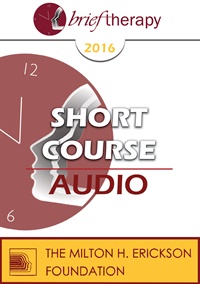
- Average Rating:
- Not yet rated
- Topic Areas:
- Hypnosis | Short Courses | Utilization | Brief Therapy | Ericksonian Hypnosis and Therapy Techniques | Self-Hypnosis
- Categories:
- Brief Therapy Conference | Brief Therapy Conference 2016
- Faculty:
- Jeffrey Feldman, PhD
- Duration:
- 1:21:10
- Format:
- Audio Only
- Original Program Date:
- Dec 08, 2016
- Short Description:
- This short course will introduce two self-hypnotic techniques. The first builds upon the “heart lock in” technique of Hearthmath. The second transforms psychomotor agitation to a self-soothing rhythmic brain input that enables individuals to “get in touch with the wealth of life experience at their fingertips”.
- Price:
- $15.00 - Base Price
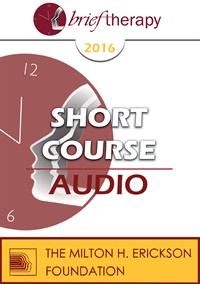
- Average Rating:
- Not yet rated
- Topic Areas:
- Short Courses | Brief Therapy | Children and Adolescent Therapy | Hypnotic Induction | Psychotherapy
- Categories:
- Brief Therapy Conference | Brief Therapy Conference 2016
- Faculty:
- Bette Freedson, MSW
- Duration:
- 1:30:02
- Format:
- Audio Only
- Original Program Date:
- Dec 08, 2016
- Short Description:
- This workshop presents the SOLVE method, a brief 5-step approach to psychotherapy with young clients that effectively orients toward decreased anxiety, increase in number of positive cognitions, enhanced problem solving and enduring behavioral changes. Participants will explore and experience how induction, visualization and didactics empower lasting behavioral and emotional improvement.
- Price:
- $15.00 - Base Price
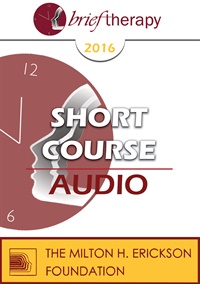
- Average Rating:
- Not yet rated
- Topic Areas:
- Short Courses | Brief Therapy | Neuroscience
- Categories:
- Brief Therapy Conference | Brief Therapy Conference 2016
- Faculty:
- James Rini
- Duration:
- 1:27:43
- Format:
- Audio Only
- Original Program Date:
- Dec 08, 2016
- Short Description:
- Rapid Interpersonal Neural Integration packages the essential elements from the works of Milton Erickson, Fritz Perls, Virginia Satir, Jeffrey Zeig, and Ernest Rossi to facilitate lasting change through rapid neural integration. The mindsets and blind-spots identified through the interview process and observations guide the therapist as to how the mindsets and blind-spots need to be refined. The therapist then helps the client transform the flow of energy and information away from blockages and distortions by addressing the fear(s) underlying and feeding the mindsets and blind-spots.
- Price:
- $15.00 - Base Price
Tags: Brief Therapy Neuroscience
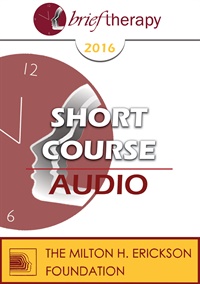
- Average Rating:
- Not yet rated
- Topic Areas:
- Short Courses | Brief Therapy | Communication | Relationships | Therapeutic Relationship | Humor
- Categories:
- Brief Therapy Conference | Brief Therapy Conference 2016
- Faculty:
- John Lentz, D. Min.
- Duration:
- 1:40:07
- Format:
- Audio Only
- Original Program Date:
- Dec 08, 2016
- Short Description:
- One liners that change people is the epitome of brief therapy. All of us have had times when one thing was said at the right moment by the right person and suddenly the world was seen differently. This workshop invites you to recognize elements that make those magic moments possible.
- Price:
- $15.00 - Base Price
- Average Rating:
- Not yet rated
- Topic Areas:
- Short Courses | Mindfulness | Habits | Brief Therapy | Psychotherapy
- Bundle(s):
- Learning Track - Mindfulness
- Categories:
- Brief Therapy Conference | Brief Therapy Conference 2016
- Faculty:
- Lawrence Peltz, MD
- Course Levels:
- Master Degree or Higher in Health-Related Field
- Duration:
- 1:30:12
- Format:
- Audio and Video
- Original Program Date:
- Dec 08, 2016
- Short Description:
- We all have habits, from seemingly harmless to life threatening. But how do they work? And what makes them so resistant to change? This workshop presents a simple model of four categories of experience—the benefits and costs of maintaining v. relinquishing a habit. This brief approach emphasizes mindfulness practice and works well with other psychotherapeutic methods.
- Price:
-
Sale is $29.00
price reduced from Base Price - $59.00
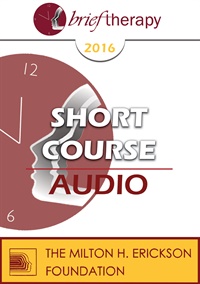
- Average Rating:
- Not yet rated
- Topic Areas:
- Short Courses | Brief Therapy | Community | Multicultural | Therapist Development
- Categories:
- Brief Therapy Conference | Brief Therapy Conference 2016
- Faculty:
- Karin Schlanger, MFT | Gloria Diaz Arnal, MFT Intern
- Duration:
- 1:11:09
- Format:
- Audio Only
- Original Program Date:
- Dec 08, 2016
- Short Description:
- Palo Alto Brief Therapy model applied in an educational context. Focus on advantages of using this approach when the context is a challenge in itself. The presenters – Ms. Schlanger is the heir to the MRI-Brief Therapy model, will bring examples illustrating a useful model when working with a diverse community.
- Price:
- $15.00 - Base Price
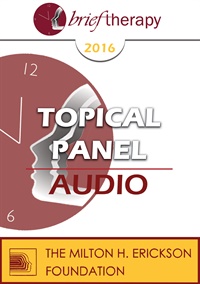
- Average Rating:
- Not yet rated
- Topic Areas:
- Topical Panels | Brief Therapy | Resources | Therapeutic Relationship
- Categories:
- Brief Therapy Conference | Brief Therapy Conference 2016
- Faculty:
- A. Steven Frankel, PhD, JD, ABPP | Scott Miller, PhD | Ronald Siegel, PsyD | Michael Yapko, PhD
- Duration:
- 1:01:03
- Format:
- Audio Only
- Original Program Date:
- Dec 10, 2016
- Short Description:
- BT16 Topical Panel 1 - Client Resources Therapist Resources - Steve Frankel, Scott Miller, Ron Siegel, and Michael Yapko Topical Panel on Client Resource Therapist Resources
- Price:
- $15.00 - Base Price
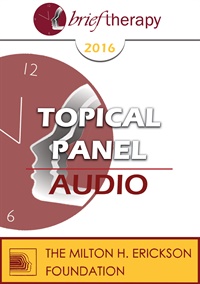
- Average Rating:
- Not yet rated
- Topic Areas:
- Family Therapy | Couples Therapy | Topical Panels | Brief Therapy | Marriage
- Categories:
- Brief Therapy Conference | Brief Therapy Conference 2016
- Faculty:
- Lynn Lyons, LICSW | Wendel Ray, PhD | Stan Tatkin, PsyD, MFT | Jeffrey Zeig, PhD
- Duration:
- 1:02:12
- Format:
- Audio Only
- Original Program Date:
- Dec 10, 2016
- Short Description:
- BT16 Topical Panel 5 - Family and Marital Therapy - Lynn Lyons, Wendel Ray, Stan Tatkin, and Jeffrey Zeig Topical Panel on Family and Marital Therapy
- Price:
- $15.00 - Base Price
Please wait ...


